Robert Watson-Watt & Radar
> Sophiapangloss
> Scotland
> So what have the Scots ever done for us?
> M - S
Robert Watson-Watt. Sir Robert Alexander Watson-Watt, KCB, FRS, FRAeS (13 April 1892 – 5 December 1973) was a pioneer and significant contributor to the development of radar.
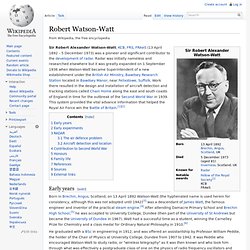
Radar was initially nameless and researched elsewhere but it was greatly expanded on 1 September 1936 when Watson-Watt became Superintendent of a new establishment under the British Air Ministry, Bawdsey Research Station located in Bawdsey Manor, near Felixstowe, Suffolk. Work there resulted in the design and installation of aircraft detection and tracking stations called Chain Home along the east and south coasts of England in time for the outbreak of the Second World War in 1939.
This system provided the vital advance information that helped the Royal Air Force win the Battle of Britain.[1][2] Early years[edit] He graduated with a BSc in engineering in 1912, and was offered an assistantship by Professor William Peddie, the holder of the Chair of Physics at University College, Dundee from 1907 to 1942. Early experiments[edit]
Robert Watson-Watt Feature Page on Undiscovered Scotland.
Sir Robert Alexander Watson-Watt, FRS, FRAeS, lived from 13 April 1892 to 5 December 1973.
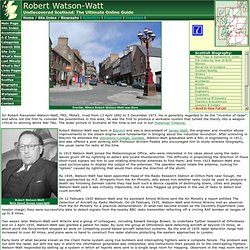
He is generally regarded to be the "inventor of radar": and while not the first to consider the possibilities in this area, he was the first to produce a workable system that turned the theory into a weapon critical to winning World War Two. The wider picture in Scotland at the time is set out in our Historical Timeline. Robert Watson-Watt was born in Brechin and was a descendant of James Watt, the engineer and inventor whose improvements to the steam engine were fundamental in bringing about the industrial revolution. After schooling in Brechin he attended the University College, Dundee. Watson-Watt graduated with a BSc in engineering in 1912, and was offered a post working with Professor William Peddie who encouraged him to study wireless telegraphy, the usual name for radio at the time.
Sir Robert Watson-Watt.
Sir Robert Watson-Watt was born in Brechin, Angus and was educated at Damacre School in Brechin and Brechin High School.
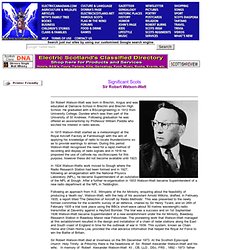
He graduated with a BSc(engineering) in 1912 from University College, Dundee which was then part of the University of St Andrews. Following graduation he was offered an assistantship by Professor William Peddie who excited his interest in radio waves. In 1915 Watson-Watt started as a meteorologist at the Royal Aircraft Factory at Farnborough with the aim of applying his knowledge of radio to locate thunderstorms so as to provide warnings to airmen. During this period Watson-Watt recognised the need for a rapid method of recording and display of radio signals and in 1916 he proposed the use of cathode ray oscilloscopes for this purpose, however these did not become available until 1923.
Following an approach from H.E.
Sir Robert Watson-Watt - Inventor of Radar. Born in Brechin as Watson Watt, a direct descendant of the inventor James Watt, he studied at Dundee, at that time an off-shoot of St Andrew's University.
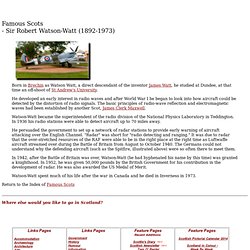
He developed an early interest in radio waves and after World War I he began to look into how aircraft could be detected by the distortion of radio signals. The basic principles of radio-wave reflection and electromagnetic waves had been established by another Scot, James Clerk Maxwell.
THE PIONEER OF RADAR ……… RA(dio) D(etection) A(nd) R(anging) n. radar. Angus Heritage - Sir Robert Watson Watt. The Observatory, Pitlochry, Perthshire, Scotland. Sir Robert Watson-Watt inventor of Radar, a short life Little in his background provides any clues that this is the course he would follow.
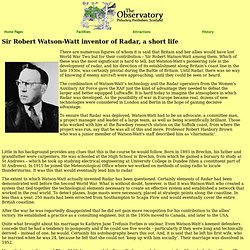
Born in 1893 in Brechin, his father and grandfather were carpenters. He was schooled at the High School in Brechin, from which he gained a bursary to study at St Andrews – which he took up studying electrical engineering at University College in Dundee (then a constituent part of St Andrews). In 1915 he joined the Meteorological Office where we worked on methods of using radio to locate thunderstorms. It was this that would eventually lead him to radar. The extent to which Watson-Watt actually invented Radar has been questioned. After the war he was reportedly disappointed that he did not gain more recognition for his contribution to the allies’ victory. Quite what brought about his marriage to Kathryn Jane Trefusis Forbes is unclear.
Robert Watson Watt Interview.
Vic the Vicar!: Robert Watson-Watt: Father of RADAR. Whilst on the theme of poetry, one of my favourites 'Rough Justice' comes from the pen of Sir Robert Alexander Watson-Watt (RAWW) the pioner (and in my view, the father) of RAdio Detection And Ranging (RADAR).
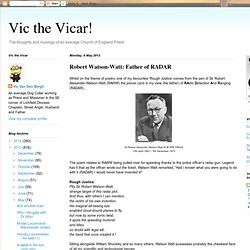
The poem relates to RAWW being pulled over for speeding thanks to the police officer's radar gun. Legend has it that as the officer wrote out the ticket, Watson-Watt remarked, 'Had I known what you were going to do with it (RADAR) I would never have invented it!
' Rough JusticePity Sir Robert Watson-Watt, strange target of this radar plot,And thus, with others I can mention, the victim of his own invention.His magical all-seeing eye enabled cloud-bound planes to fly,but now by some ironic twist, it spots the speeding motoristand bites,no doubt with legal wit, the hand that once created it ! Sitting alongside William Shockley and so many others, Watson Watt possesses probably the cheekiest face of all my scientific and technologist heroes.
Microsoft Word - WatsonWatt.doc - WatsonWatt.pdf.
Inventor of the Week: Archive. Inventor of the Week Archive Browse for a different Invention or Inventor.
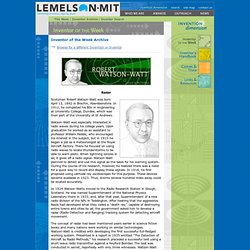
Robert Watson-Watt. Robert Watson-Watt is credited with inventing the radar which played an invaluable part in the Battle of Britain.
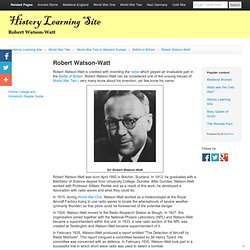
Robert Watson-Watt can be considered one of the unsung heroes of World War Two - very many know about his invention, yet few know his name. Robert Watson-Watt was born April 1892 in Brechin, Scotland. In 1912, he graduated with a Batchelor of Science degree from University College, Dundee. After Dundee, Watson-Watt worked with Professor William Peddie and as a result of this work, he developed a fascination with radio waves and what they could do. In 1915, during World War One, Watson-Watt worked as a meteorologist at the Royal Aircraft Factory trying to use radio waves to locate the whereabouts of severe weather (primarily thunder) so that pilots could be forewarned of the potential danger.
Sir Robert Watson-Watt. Radar Personalities Sir Robert Watson-Watt Sir Robert Watson-Watt was born in Brechin, Angus and was educated at Damacre School in Brechin and Brechin High School.
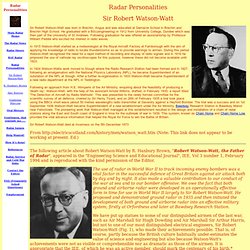
He graduated with a BSc(engineering) in 1912 from University College, Dundee which was then part of the University of St Andrews. Following graduation he was offered an assistantship by Professor William Peddie who excited his interest in radio waves. In 1915 Watson-Watt started as a meteorologist at the Royal Aircraft Factory at Farnborough with the aim of applying his knowledge of radio to locate thunderstorms so as to provide warnings to airmen. In 1924 Watson-Watts work moved to Slough where the Radio Research Station had been formed and in 1927, following an amalgamation with the National Physics Laboratory (NPL), he became Superintendent of an outstation of the NPL at Slough. Following an approach from H.E.
Robert Watson-Watt biography. Famous for: Discovering radar as a crucial means of defence during the Second World War Using radar for air and maritime navigation during peacetime.
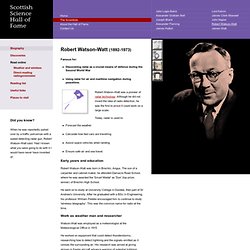
Robert Watson-Watt was a pioneer of radar technology. Although he did not invent the idea of radio detection, he was the first to prove it could work on a large scale. Today, radar is used to: Forecast the weather Calculate how fast cars are travelling Assist space vehicles when landing Ensure safe air and sea travel. Early years and education. Robert Watson-Watt.
Robert Watson-Watt, the son of a carpenter, was born in Brechin, Scotland, on 13th April, 1892. A direct descendant of James Watt, Watson-Watt was educated at University of St Andrews. Watson-Watt joined the Royal Aircraft Factory in Farnborough as a meteorologist in 1915. Watson-Watt used his knowledge of radio to try and devise a system to warn airman of local thunderstorms. During the First World War he researched the idea of developing a rapid method of displaying radio signals on aircraft and in 1916 proposed the use of cathode ray oscilloscopes to provide this information to pilots.
Robert Watson-Watt. Robert Watson-Watt AKA Robert Alexander Watson Watt Born: 13-Apr-1892Birthplace: Brechin, Angus, ScotlandDied: 5-Dec-1973Location of death: Inverness, ScotlandCause of death: unspecifiedRemains: Buried, Pitlochry Episcopal Churchyard, Pitlochry, Scotland Gender: MaleReligion: PresbyterianRace or Ethnicity: WhiteSexual orientation: StraightOccupation: Physicist, Inventor Nationality: ScotlandExecutive summary: Radar Numerous scientists contributed to the development of radar, but none have a clearer claim as radar's inventor than Scottish physicist Robert Watson-Watt.
Robert Watson-Watt. Sir Robert Watson-Watt (1892-1973) So, who was Robert Watson-Watt? Have you heard of RADAR? Robert Watson-Watt was born on 13th April 1892 at Brechin, Scotland. He went to school in Brechin; firstly Damacre School and then Brechin High School. From there he entered University College, Dundee, which was then a part of St Andrew's University.
British Postal Museum & Archive. The stamp below is from the set issued in March 1991 celebrating Scientific Achievements.
Robert Watson-Watt Society celebrates statue plan progress - News. Plans to erect a memorial in Brechin to the 'father of radar' have taken a major step forward after the proposals cleared a major planning hurdle. Angus Council's development standards committee this week gave their unanimous support to the proposals -- paving the way for a statue to be erected in Brechin's St Ninians Square.
Once erected the statue will commemorate one of Brechin's most famous sons, Sir Robert Watson-Watt, who invented radar and helped Britain to fight the Nazi menace in the second world war. At the meeting that passed the planning application, Angus Council leader Bob Myles said the statue would be a strong addition to Brechin's heritage and would recognise the massive contribution that Watson-Watt had made to modern life. He said, "I'm fully behind this.
Scottish radar inventor, Sir Robert Watson-Watt, honoured with £30,000 bronze statue in Angus 40 years after his death.
Sir Robert Watson-Watt.










